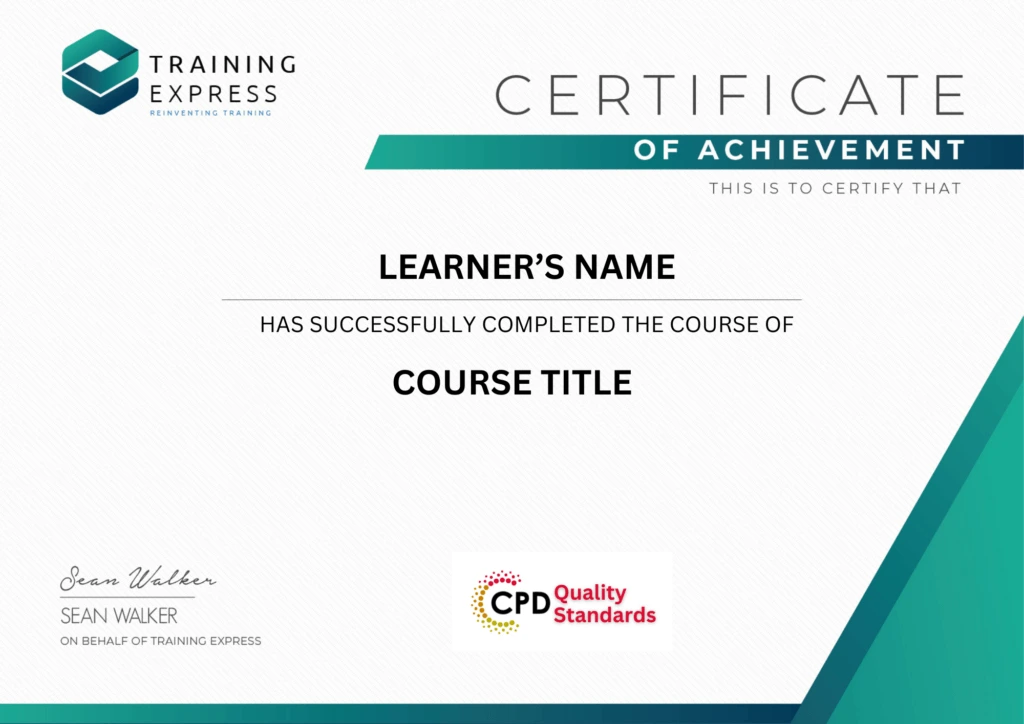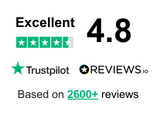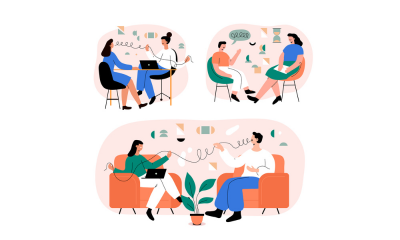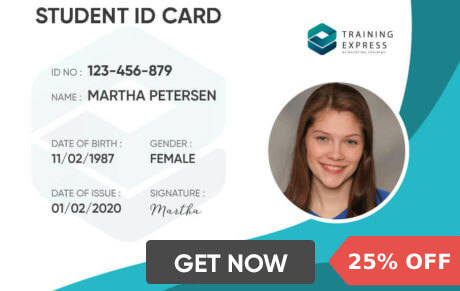GET THIS COURSE AND 1500+ OTHERS FOR ONLY £99 FIND OUT MORE
Our Advanced Diploma in Counselling Online course offers a detailed exploration into the broad and often misunderstood world of mental health support. Covering a wide range of counselling approaches, therapeutic techniques, and psychological disorders, this course has been designed for those who want to deepen their understanding of human behaviour, emotional well-being, and interpersonal dynamics — without sounding like they’ve read one too many self-help books.
From foundational theories to complex clinical considerations, the course unfolds gradually, helping you build the knowledge to engage with individuals facing life’s trickier moments — whether that involves anxiety, relationship conflict, mood disorders, or a surprise visit from existential dread. Modules range from childhood mental health and family dynamics to low-intensity CBT and crisis intervention, giving a panoramic view of counselling with just the right amount of scholarly flair. You’ll also brush up on key legal and ethical frameworks, because therapy without boundaries is just brunch with feelings.
Key Features of Diploma in Counselling
- Accredited by CPD
- Instant e-certificate and hard copy dispatch by next working day
- Fully online, interactive course with Professional voice-over
- Developed by qualified professionals
- Free Certificate Include
- Self paced learning and laptop, tablet, smartphone friendly
- 24/7 Learning Assistance
- Discounts on bulk purchases
£25,540 Average Salary, Up to £40,622/yr for this skill according to top UK career sites.
Learning Outcomes
By the end of the Diploma in Counselling Online Course, learners will be able to:
- Understand major counselling theories and psychological treatment models.
- Recognise various mental health disorders across age groups.
- Explore ethical issues in counselling and mental health services.
- Learn communication techniques essential for therapeutic conversations.
- Analyse approaches to crisis intervention and client assessment.
- Gain insight into family law relevant to counselling contexts.
Why take this Online Diploma in Counselling
Our Advanced Online Diploma in Counselling is thoughtfully crafted to deepen your understanding of human behaviour, emotional wellbeing, and therapeutic approaches. Whether you’re looking to expand your existing counselling skills or explore a new professional path, this course offers valuable insights into a wide range of counselling methods, client communication strategies, and ethical considerations.
Through this online diploma in counselling course, you’ll develop the confidence to support others in navigating personal challenges, all while enhancing your own personal development. Ideal for those already in the mental health or support sector, as well as anyone looking to begin or progress in this field, this diploma helps sharpen your expertise and broaden your career opportunities in a compassionate and increasingly essential profession.
Who is this Diploma in Counselling Online Course For?
Anyone with a knack for learning new skills can benefit from diploma in counselling online training. While this thorough training is popular for preparing people for job opportunities in the relevant fields, it also helps to advance your career for promotions.
This course is suitable for individuals in various roles, including those listed below:
- Those interested in mental health and emotional well-being.
- Professionals seeking to explore counselling as a second field.
- Life coaches wanting to expand their psychological understanding.
- Teachers or educators supporting pupils with mental health needs.
- Career changers wanting to explore online healthcare training.
- Volunteers working in hospitals, care homes or clinics.
- Teaching assistants supporting children with medical needs.
- Learners looking to study healthcare without physical class attendance.
Certification of Advanced Diploma in Counselling
Once you’ve successfully completed your course, you will immediately be sent a digital certificate. Also, you can have your printed certificate delivered by post (shipping cost £3.99). All of our courses are fully accredited, providing you with up-to-date skills and knowledge and helping you to become more competent and effective in your chosen field. Our certifications have no expiry dates, although we do recommend that you renew them every 12 months.

Accreditation of Online Diploma in Counselling
All of our courses, including this Advanced Diploma in Counselling , are fully accredited, providing you with up-to-date skills and knowledge and helping you to become more competent and effective in your chosen field.
Job Opportunities – Advanced Diploma in Counselling Online Course
The Advanced Diploma in Counselling provides learners with a strong theoretical foundation and practical insight into emotional support, client communication, and therapeutic techniques. This counselling course prepares individuals to work in diverse settings where empathy, discretion, and interpersonal skills are essential. From understanding mental health conditions to applying key counselling frameworks, students are equipped to support individuals through personal challenges with professionalism and care.
Completing this online counselling diploma opens up various career pathways in community services, healthcare, education, and private practice. The course also supports those already in the sector to move into more focused or senior roles involving client-facing work and mental wellbeing initiatives.
Key job opportunities after a counselling diploma course include:
- Counsellor (Private Practice or Organisation-Based)
- Mental Health Support Worker
- School or College Counsellor Assistant
- Addiction Support Worker
- Bereavement Counsellor
- Helpline Adviser
- Youth Support Worker
- Rehabilitation Support Practitioner
- Employee Assistance Programme (EAP) Adviser
- Community Outreach Worker
Career Path for Observation Skills
Completing the Advanced Diploma in Counselling online course can lead to rewarding roles across the care and education sectors. It supports both career entry and progression opportunities.
Below we mention the average salary for some common roles related to this course:
- Counsellor – £30,000–£40,000 per year
- Mental Health Support Worker – £24,000–£32,000 per year
- Family Support Worker – £25,000–£35,000 per year
- School Counsellor – £28,000–£38,000 per year
- Substance Misuse Practitioner – £27,000–£36,000 per year
- CBT Therapist (Low Intensity) – £33,000–£42,000 per year
Course Curriculum
The detailed curriculum outline of our online diploma in counselling is as follows:
Module 01: Counselling and Counsellors
This module defines the role and responsibilities of a counsellor in various settings. It outlines core counselling skills, the purpose of counselling, and the key qualities needed to build trust and rapport with clients.
Module 02: Theories and Models of Counselling (Part 1)
Focuses on foundational counselling theories such as person-centred, behavioural, and psychodynamic approaches. The content explains how these models guide practical interventions and influence therapeutic outcomes.
Module 03: Theories and Models of Counselling (Part 2)
Builds upon the previous module by introducing advanced and integrative models including cognitive, systemic, and eclectic approaches. Learners gain an understanding of applying multiple frameworks in complex client cases.
Module 04: Legal, Cultural and Ethical Issues in Professional Counselling
Covers the legal responsibilities, cultural considerations, and ethical boundaries counsellors must uphold. Topics include confidentiality, duty of care, and respecting client diversity.
Module 05: Forms of Psychotherapy
Presents the major types of psychotherapy used in practice. This includes approaches like Cognitive Behavioural Therapy (CBT), Dialectical Behaviour Therapy (DBT), and solution-focused therapy.
Module 06: Counselling and Psychotherapy
Clarifies the differences and similarities between counselling and psychotherapy. Learners understand how each approach addresses client issues and when one may be more appropriate than the other.
Module 07: Dynamic Psychotherapy
Introduces psychodynamic psychotherapy and its use in addressing unconscious emotional conflicts. The content highlights techniques, client suitability, and the therapist-client relationship.
Module 08: Childhood and Adolescent Psychiatric Disorders
Outlines common mental health disorders in children and teenagers. Includes signs, symptoms, developmental factors, and the importance of early detection and appropriate support.
Module 09: Counselling Children and Adolescents in Schools
Covers strategies for supporting young people in educational environments. Emphasis is placed on communication techniques, behavioural interventions, and collaboration with school staff.
Module 10: Counselling Trauma and Substance Abuse
Addresses the challenges of working with clients affected by trauma and substance misuse. Learners are introduced to trauma-informed care and addiction counselling practices.Explore foundational theories that shape modern counselling practice. Learn how humanistic, cognitive-behavioural, and psychodynamic models influence therapeutic approaches and guide client support strategies.
Module 11: Counselling Stress and Anxiety Disorders
Provides knowledge on the types of anxiety disorders, their symptoms, and causes. Includes counselling techniques for managing generalised anxiety, panic disorder, and phobias.
Module 12: Counselling Personality Disorders
Focuses on identifying and understanding personality disorders such as borderline, narcissistic, and avoidant. The module outlines practical counselling techniques suitable for long-term support.
Module 13: Counselling Mood Disorders and Depression
Details how mood disorders affect individuals and how counselling can support their recovery. The content includes major depressive disorder, bipolar disorder, and evidence-based therapeutic strategies.
Module 14: Counselling Eating & Sleeping Disorders
Explains the psychological impact of eating and sleeping disorders. Learners gain insight into treatment planning, behavioural change techniques, and multi-disciplinary approaches.
Module 15: Life Coaching and Career Counselling
Introduces the principles of personal and professional development. Topics include goal setting, career assessment tools, and motivation-building strategies for clients seeking life changes.
Module 16: Introduction to Family Law
Provides a basic overview of family law and its relevance in counselling. Topics include legal definitions of marriage, separation, child welfare, and parental responsibility.
Module 17: Framing Family Law
Examines how family law is structured and applied. Includes legal rights and duties, child custody arrangements, and the legal context behind family disputes.
Module 18: Marriage in Family Law
Focuses on the legal elements of marriage and civil partnerships. The module also addresses counselling strategies to support clients navigating legal and emotional complexities in their relationships.
Module 19: Domestic Violence
Highlights the impact of domestic abuse and how to provide safe, non-judgemental support. Covers recognising signs, risk assessment, and safety planning.
Module 20: Couple and Family Counselling
Covers techniques for improving communication and resolving conflict within families and couples. Emphasises the value of neutrality and creating a collaborative counselling environment.
Module 21: Conflict Resolution
Equips learners with tools to mediate and manage interpersonal conflict. The module outlines conflict types, resolution models, and strategies for guiding clients through emotional tension.
Module 22: Pre-Marital Counselling
Focuses on helping couples prepare for long-term commitment. Topics include communication styles, shared values, financial planning, and setting expectations.
Module 23: Affairs
Addresses the emotional and psychological effects of infidelity. Learners examine how to support clients through betrayal, rebuild trust, and make informed decisions.
Module 24: Apology & Forgiveness
Explores the role of apology and forgiveness in the healing process. The content includes therapeutic techniques for emotional closure and relationship repair.
Module 25: Adapting to Changes
Teaches counselling strategies to assist clients during life transitions, such as loss, relocation, or career change. Emphasis is placed on building resilience and coping skills.
Module 26: Counselling Self-Harm and Suicide
Covers how to identify, assess, and respond to self-harm and suicidal behaviours. The module includes safety planning, intervention models, and referral procedures.
Module 27: Engaging and Assessing the Patients
Details the assessment process in counselling, from the initial session to ongoing evaluation. Learners study how to build rapport, gather information, and set realistic goals.
Module 28: Helping the Client in Crisis
Provides practical techniques for handling client crises. Focuses on emotional de-escalation, support frameworks, and maintaining a calm and supportive environment.
Module 29: Crisis Intervention
Presents structured approaches for intervening during acute psychological distress. Includes immediate care techniques and collaborative crisis management plans.
Module 30: Low Intensity CBT Treatment
Introduces CBT methods designed for clients with mild to moderate symptoms. Learners study structured interventions, behavioural activation, and guided self-help tools.
Module 31: Medication and Therapy in the Treatment of Mental Illness
Explains how medication complements therapy in treating mental health conditions. Covers medication types, benefits, side effects, and the therapist’s role in integrated care.
Module 32: Communication Skills and Empathy in Counselling
Focuses on developing core communication skills essential to effective counselling. Topics include active listening, empathy, non-verbal cues, and building therapeutic alliances.
Diploma in Counselling Online Training Reviews

FAQs About Advance Online Diploma in Counselling
How to get a diploma in counselling?
To get a diploma in counselling, you need to enrol in a recognised training programme that offers in-depth theoretical knowledge and practical skills. Our Advanced Diploma in Counselling is a fully online course designed to meet industry standards. It covers core topics like counselling theories, ethical issues, mental health disorders, family dynamics, and communication techniques. You can study at your own pace, take assessments online, and receive a verifiable certificate upon completion. No prior experience is required, making it ideal for beginners or those looking to upskill. Completing this course not only gives you a diploma but also prepares you for real-world counselling roles or further academic study in psychology or mental health.
Is a diploma in counselling worth it?
Yes, a diploma in counselling is worth it—especially if you’re looking to upskill or start a meaningful career in mental health support. It equips you with essential skills like active listening, empathy, and ethical practice, which are vital in both professional and personal settings. The qualification can open doors to roles in education, healthcare, social work, and private practice. It’s also a recognised pathway toward advanced study or accreditation. Beyond career opportunities, many students report increased confidence and improved communication skills. Whether you’re transitioning careers or enhancing your current role, this diploma offers both practical value and personal growth, making it a strong investment in today’s people-focused job market.
What can you do with a diploma in counselling?
A diploma in counselling unlocks diverse career paths in mental health and social services. You can work as a counsellor in schools, clinics, or private practice, specializing in areas like youth, addiction, or family therapy. Roles like case worker or support specialist in community services are also options. The diploma equips you with skills like empathy and active listening, ideal for helping clients navigate challenges. It’s a stepping stone for further studies, such as a Master’s in Counselling, or starting your own practice. With growing demand for mental health support, salaries range from $70,000-$84,000 annually, offering rewarding opportunities
What is a diploma in counselling?
A diploma in counselling is a professional qualification that trains individuals to support others through emotional, mental health, or life challenges. It covers key areas like counselling theories, communication techniques, ethical practice, and real-world scenarios. Students learn how to listen effectively, build trust, and guide clients in managing stress, anxiety, trauma, or relationship issues. The course typically includes both theoretical and practical components, preparing learners for entry-level counselling roles or further study. It’s ideal for those pursuing a counselling career or looking to enhance their people skills in healthcare, education, or support services. This diploma is a strong foundation for anyone committed to helping others and building a meaningful, people-focused profession.
Are online counselling diplomas legal in the UK?
Yes, online counselling diplomas are legal in the UK if offered by accredited institutions recognized by bodies like the Training Express. Always verify the provider’s accreditation to ensure the qualification meets professional standards. These diplomas allow you to practice as a counsellor, often in roles like private practice or community services, though some employers may prefer degree-level qualifications. Check that the course aligns with UK regulations and includes supervised practice to ensure credibility and employability.
How to become a counsellor?
To become a counsellor, you typically need formal training, practical skills, and a recognised qualification. Start by enrolling in a structured course like an Advanced Diploma in Counselling. Our course is accredited by CPD Quality Standards This provides essential knowledge in mental health, ethics, therapy models, and communication techniques. Most diploma courses include practical case studies or supervised practice to prepare you for real-world settings. After completing your training, you can pursue registration with a professional counselling body, which enhances your credibility and employability. Many roles also value additional experience in social care or volunteering. With the right course and commitment, you can build a meaningful career helping others overcome personal challenges.
What jobs can I get with this counselling skills and knowledge?
With counselling skills and knowledge gained from an advanced diploma, you can pursue various roles that focus on emotional support, mental health, and client wellbeing. These include counsellor, support worker, mental health assistant, youth worker, addiction support specialist, and family liaison officer. Many professionals also use these skills in roles like teaching assistant, HR officer, or community outreach worker. This training strengthens active listening, empathy, and conflict resolution—skills valued in both public and private sectors. Whether you aim to start a counselling career or enhance your current role, these competencies are in growing demand across healthcare, education, social care, and nonprofit organisations.
What is the average salary for counsellor in the UK?
In the UK, the average salary for a qualified counsellor ranges from £25,000 to £35,000 per year, depending on experience, location, and specialisation. Newly trained counsellors often start around £20,000, while experienced practitioners in private practice or specialist roles can earn £40,000+. Salaries may also rise with additional training or accreditation. Completing an Advanced Diploma in Counselling can significantly boost your earning potential by preparing you for higher-responsibility roles in mental health, education, or private practice. This qualification not only enhances employability but also opens the door to further career progression and specialisation.
Will I receive a certificate after completing this course?
Yes, you will receive a FREE Digital Certificate after completing this online diploma in couselling training.
However, if you want, you can also order the Digital Transcript, Hardcopy Certificate & Transcript.
Ordering page link: https://www.trainingexpress.org.uk/certificate/
How do I purchase this course?
1. Click on ‘Take This Course’ button, and you will be directed to your Cart.
2. You can update the course quantity and remove any unwanted items in the Cart, and after that, click on the ‘Checkout’ option and enter your billing details.
3. Once the payment is made, you will receive an email with the login credentials, and you can start learning after logging into the portal.
You can take this course or find any course from the Courses section of our website.

SAVE 80% - OFFER ENDS SOON
£125.00Original price was: £125.00.£25.00Current price is: £25.00. ex Vat- 1 year
- Advance, Diploma
- Course Certificate
- 11 hours, 20 minutes Gift this course
Subscribe to this course and 2,000+ top‑rated Training Express courses for your organization.
Try Training Express Business- For teams of 5 or more users
- 2,000+ fresh & in-demand courses
- Learning Engagement tools
- SSO and LMS Integrations
 Food Hygiene
Food Hygiene Health & Safety
Health & Safety Safeguarding
Safeguarding First Aid
First Aid Business Skills
Business Skills Personal Development
Personal Development







